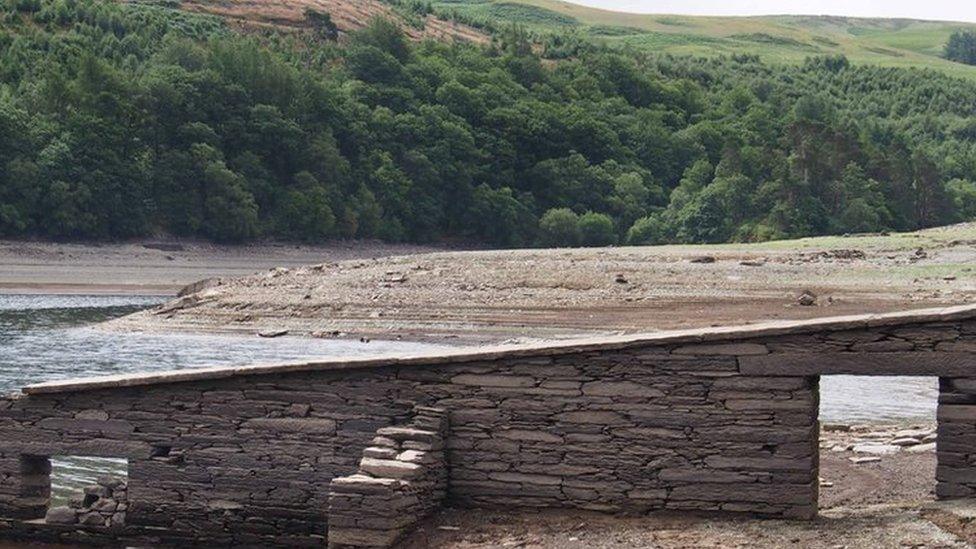Clywedog dam: Drought uncovers flooded family home
- Published
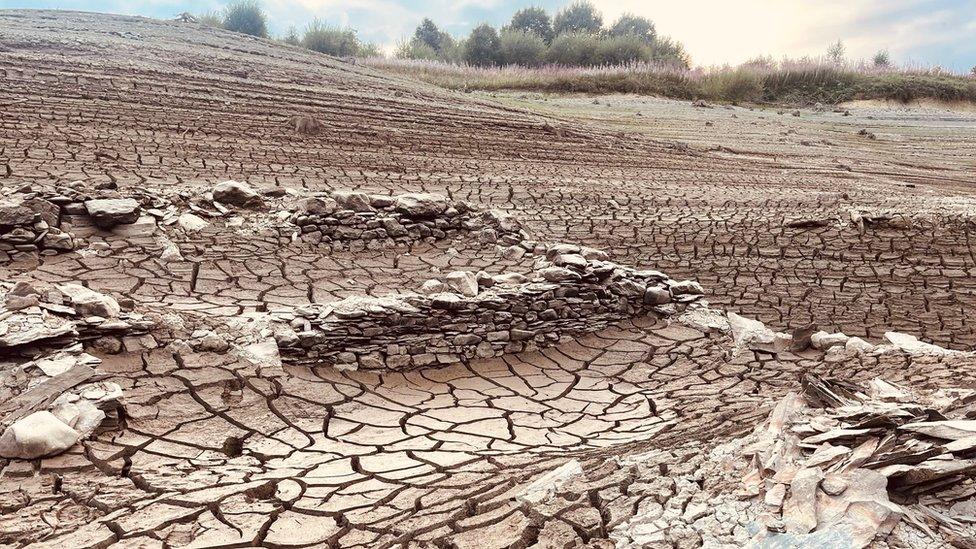
The drought uncovered the ruins of the family's tenant farm, Aberbiga
It's been hidden for almost 60 years, but one farmer and his children have finally glimpsed their family's home.
Amid the upheaval of the summer drought Aled Wyn Davies from Llanbrynmair, Powys, found a silver lining.
His father was evicted from their tenant farm, Aberbiga, in 1964, in order for the valley to be flooded to create the Clywedog dam.
Now he has been able to walk with his children to the land his father tended on an "eerie and emotional" journey.
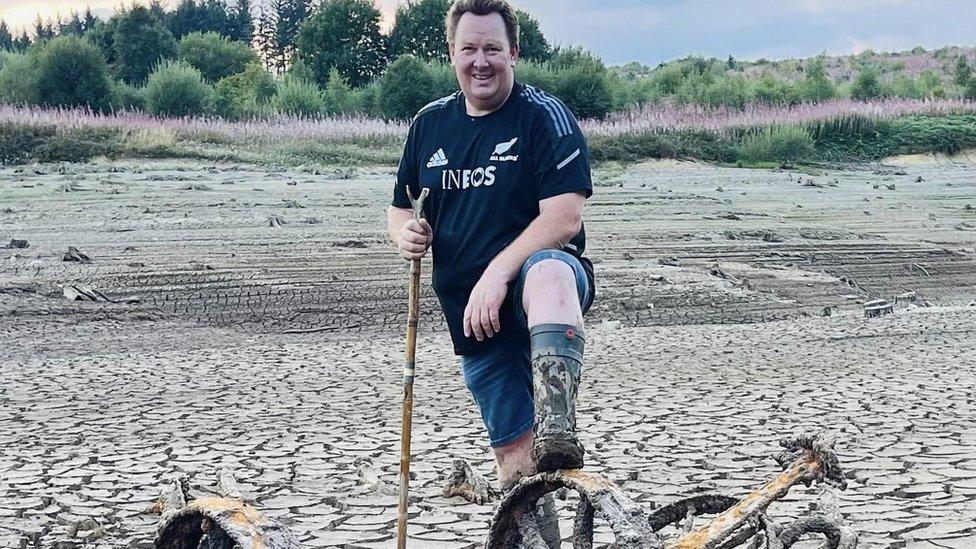
Aled Wyn Davies returned to the site of his father's farmhouse, six decades after it was flooded
After just 56.7% of the expected rain fell during March to August, water levels have dropped low enough to uncover it.
"I think it's the third time this has happened," he said.
"The first was in 1976, but I was only two at the time. The only other occasion I can remember was in 1990, when I was just a little bit older than my children are now, and my father was 48 - precisely my current age - so there's a really eerie and emotional circularity to it all."
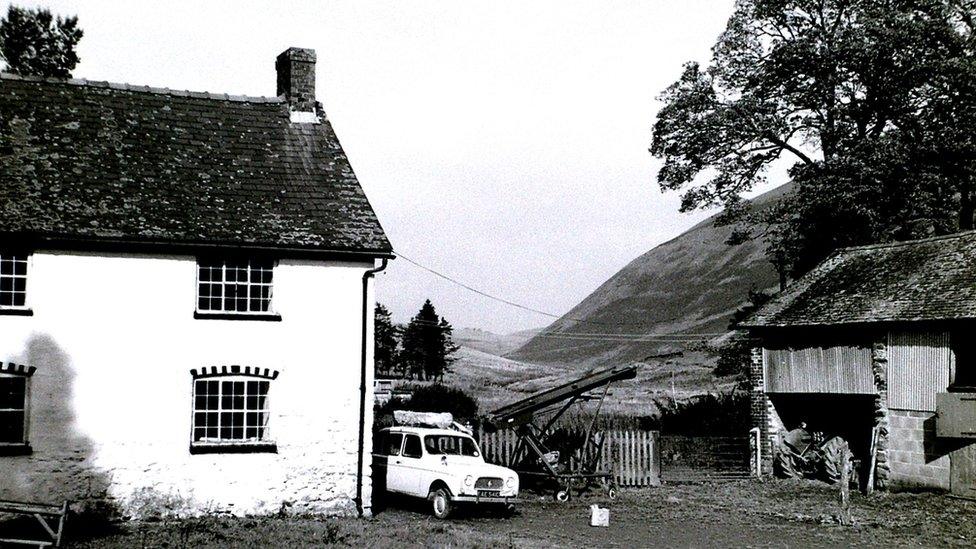
Aled Wyn Davies's father was evicted from the farm in 1964
Mr Davies said there was not the same level of resentment to the compulsory purchases at Clywedog as when the village of Capel Celyn in Gwynedd was flooded to create Tryweryn in 1965.
This is because, as well as providing water to the west Midlands, Clywedog also created much-needed defences against flooding in the upper Severn, which had devastated farming throughout the late 1950s.
"I suppose there were some protests, but many like my dad thought it was something which was inevitable sooner or later, even though this was the second time it had happened to him.
"His landlord was the Forestry Commission, and in 1941 he'd been moved to Aberbiga from his previous farm in order to plant the Hafren forest for timber towards the war effort."
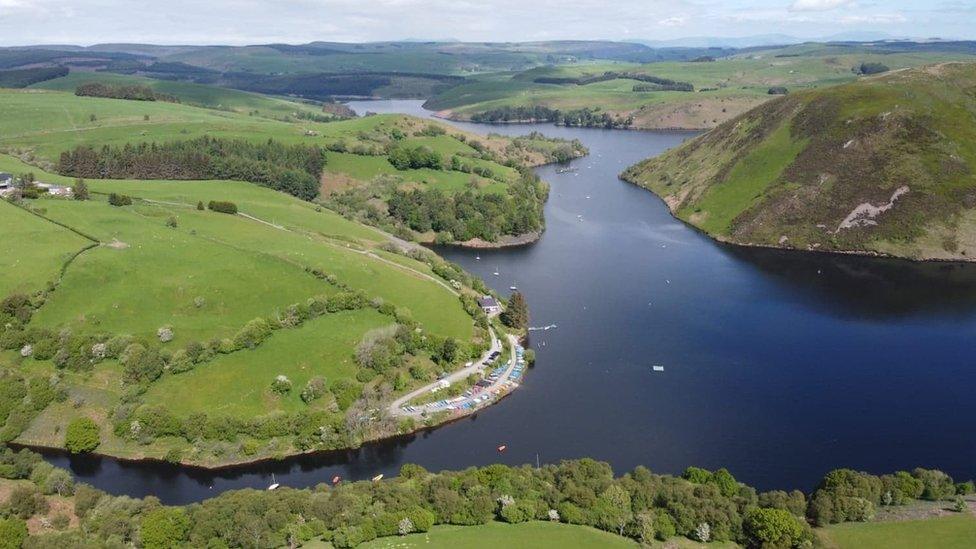
The family was evicted and the property flooded to make way for Clywedog dam
Mr Davies, who's also a prize-winning tenor, trekked to the farmhouse with his children: Aria, 12, and Aron, eight.
He said: "I was absolutely astonished to see that, as well as the foundations of the house and outbuildings, there were loads of pieces of farm equipment remaining, seemingly untouched after all these years.
"There's an old horse-drawn grass mower which I had a photo taken next to with my dad, so I was delighted to be able to do the same with Aria and Aron.
"Back in 1990, I remember my father telling me not to wander too far in case I fell in the sheep dip, and do you know, I found the self-same words coming out of my mouth all these years later."
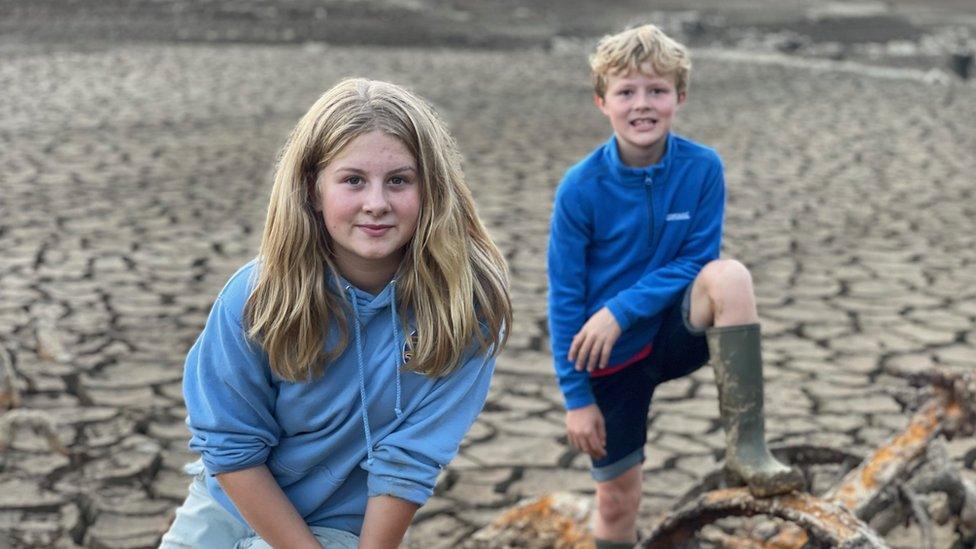
Aled Wyn Davies visited the farmhouse with his children Aria, 12, and Aron, eight
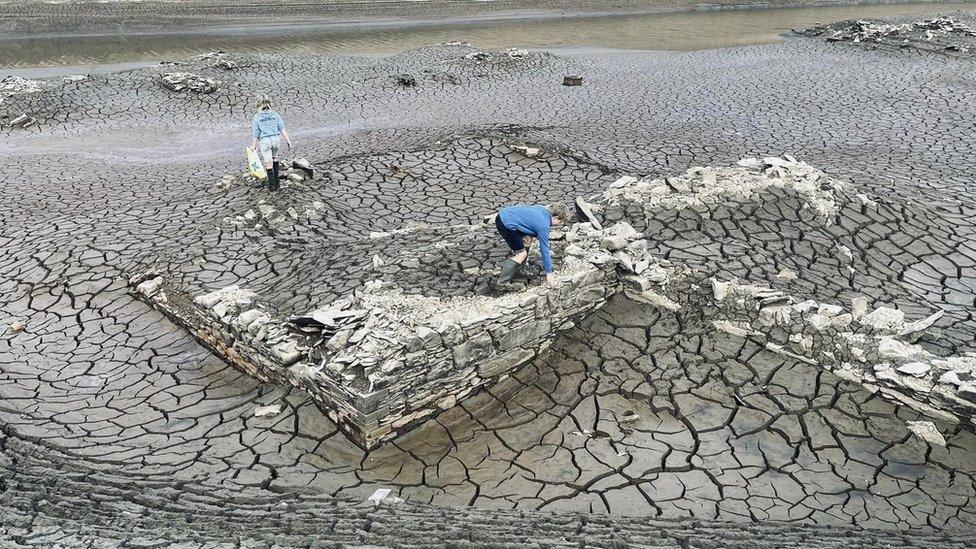
The family saw what's left of their former farmhouse
However, he said that, as lovely as it was to visit the family home again, he fears what this means for the climate.
Six of the eight driest years on record in Wales have come since 1984.
Natural Resources Wales said the drought it declared earlier this year may take until late 2023 to break.
Welsh Water uses another measure, whereby water levels in reservoirs are fine, except for south west Wales. However, it is still mindful of the potential issues.
A spokesperson said: "While some of our reservoirs have started to refill following the recent rain, we haven't seen significant enough rain across all of our area, so some still remain very low. This is particularly true of our reservoirs in south east Wales at Llandegfedd and Pontsticill.
"Over the past seven months, Wales has had the joint driest year on record, drier than 1976, and in September only saw 50% of the long-term average rainfall. That is why we continue to remind customers to avoid wasting water as this will help all of our reservoirs refill more quickly and have the best chance of being full ready for next summer.
"We are continuing to keep the water level at our Llys y Fran reservoir under close watch and monitoring how it is responding to rainfall. As soon as we are able to lift the hosepipe ban for our customers who are served by the reservoir we will do so".
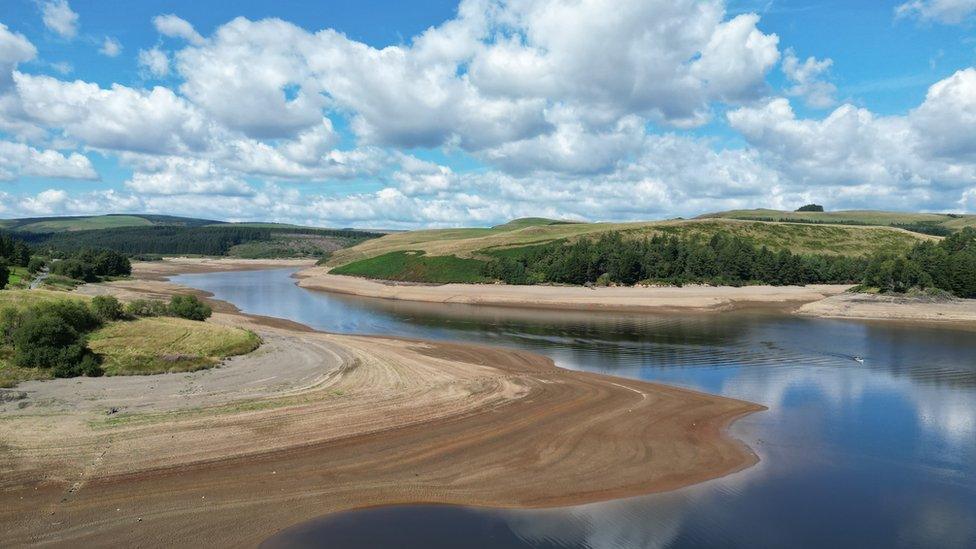
Wales has had the joint driest year on record
Tracey Dunford of Natural Resources Wales explained the different approaches taken by the two organisations.
"We'll look at environmental aspects and impacts of long periods of dry, hot weather. Water companies look at water supplies to inform when they declare drought status," she said.
"No one drought is the same in its extent, intensity and impacts.
"Shorter droughts may have immediate impact on environment, agriculture and abstractors, whilst longer droughts affect public water supplies."
Ms Dunford also warned against complacency, just because the last few weeks have been wetter and colder.
'Only part of the story'
However, Dr Yunqing Xuan, a hydro-meteorologist at Swansea University, added: "The most pessimistic forecasts still rely on the climate reverting to its normal state, and if there's one thing which the last decade or so has taught us, it's that this is by no means a certainty."
He argued that the more severe weather events we experience, the harder it becomes for the land to recover.
"Over the last year you could say we've been experiencing the 'wrong sort of rain'.
"Whilst we've had lower than average rainfall, this is only part of the story; when it has rained it's been in torrential bouts which the parched ground is unable to soak up."
Dr Xuan explained that sparse yet massively heavy downpours are soaking straight through the earth, on one hand speeding up the rate at which it flows into rivers and other watercourses, and on the other washing away the topsoil which not only holds nutrients but which would otherwise slow down future floods.
"It's a weird paradox to get your head around, but periods of drought as we're experiencing under climate change actually increase the likelihood of flooding.
"Not only that, but the dry soil which is washed away depletes the fertility of the land and increases the spawn of algae in rivers, choking fish and other waterborne life."

BAFTA CYMRU WINNERS: Celebrate the best television from Wales
WALES' HOME OF THE YEAR: Which home will Owain, Mandy and Glen judge worthy?

- Published8 September 2022
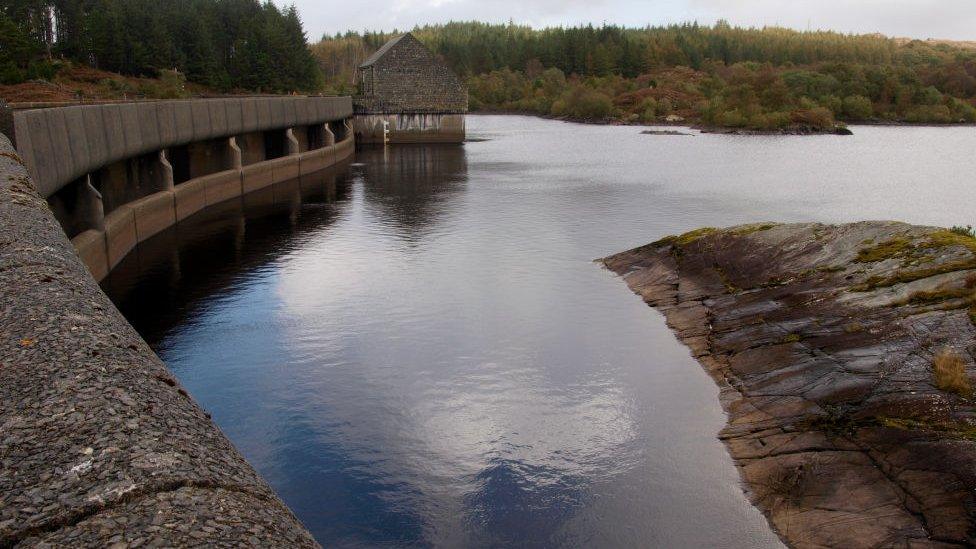
- Published17 August 2022
